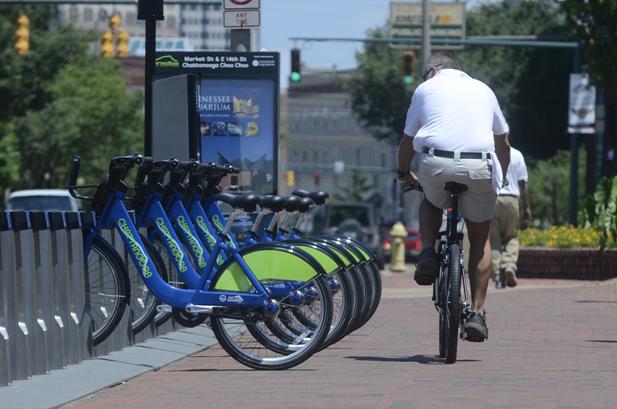Chattanooga, Tennessee, was, in a lot of ways, not an ideal city for bike-sharing. It's a somewhat sprawling city, without a strong culture of cycling and walking. In addition, only a small percentage of area residents use transit to get around, so not many are leaving the car in the garage.

But local leaders didn't use these challenges as excuses not to act to improve public health. This city of 170,000 launched the Chattanooga Bicycle Transit System last July, with 30 stations and 300 bikes dispersed around a 2.5-square mile area of downtown. In doing so, little Chattanooga beat larger cities like New York and Chicago to the punch.
"Our purpose with bike-sharing was to put a large amount of cyclists on the street in a short time, to change the dynamic, to improve our air quality, our health and active transportation overall," said Chattanooga Bike Coordinator Philip Pugliese, at the New Partners for Smart Growth Conference in Kansas City last week.
Chattanooga had studied bike-sharing since as early as 2007. During that time, bike-share supporters surveyed local residents about their interest in cycling, if they had access to a bike. About 75 percent reported some level of interest.
"We felt fairly confident that people would try this," Pugliese said.
The city was able to secure $100,000 in funding from the local Lyndhurst Foundation to launch the effort in 2009. Partnering with the local transit system, CARTA, the city of Chattanooga won federal air-quality funds the following year to jump-start the system.
In light of the obstacles, Pugliese said the budding program has been a success.
It can be difficult to launch bike-share in a small city with a transportation system that is heavily reliant on car travel, Pugliese said. But Chattanooga's experience can offer inspiration to other small cities.
In its first six months of operation, the system has provided 12,600 rides. Together, riders burned more than one million calories. All those bike trips have resulted in up to a 8,100-pound reduction in emissions. The system will add three more stations in residential neighborhoods in the spring.
"We’re pretty happy, all things considered," he said.
To encourage ridership, the first hour of each trip is free. Another challenge is that Bike Chattanooga, as the system is informally known, hasn't yet attracted a major sponsor. Securing enough capital to keep the system going through the lean start-up years is important, especially in smaller markets, where programs may find themselves on weaker financial footing than in larger cities, Pugliese said. He said the city considers the system an experimental pilot project.
Many other small cities are pursuing bike-share, conference speakers reported, including Bridgeport, Connecticut; Portland, Maine; and Fort Collins, Colorado. Panelists noted that Spartanburg, South Carolina (population 37,000), has a system with just two stations and 14 bikes.





